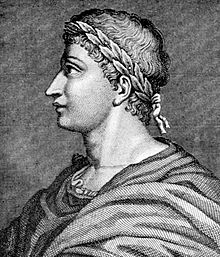 Famous for his epic works and love poems, Ovid was born in Rome in 43BC and is often viewed alongside some of the classical greats such as Horace and Virgil. Popular amongst his contemporaries, much academic effort has been expended on the mystery of his exile by the emperor Augustus. His most well-known work is a 15 book epic charting the history of the world called the Metamorphoses.
Famous for his epic works and love poems, Ovid was born in Rome in 43BC and is often viewed alongside some of the classical greats such as Horace and Virgil. Popular amongst his contemporaries, much academic effort has been expended on the mystery of his exile by the emperor Augustus. His most well-known work is a 15 book epic charting the history of the world called the Metamorphoses.
As with many high status individuals who were born into well to do families at the time, Ovid was schooled in rhetoric and was set to practice law before the death of his brother. At that time, he decided to travel, undertaking minor posts while he wrote his poetry. He was friends with many of the poets of the age and gave his first recital when he was about 18 years old.
The early part of Ovid’s work tended to center on erotic poetry though some may have been lost over the centuries. His first recognized work is thought to be Heroides, 21 poems in the form of letters using a range of characters in mythology. The collection of poetry Amores, The Loves, was written in 16BC and comprises three books. He explored seduction further in the Art of Love and by AD8 he had completed what is seen as his masterpiece, Metamorphoses.

This epic poem was spread over 15 books and explored the history of the world as Ovid saw it up until the reign of the emperor Caesar. It takes strands of both Roman and Greek mythic writing with humans transformed into objects such as trees, constellations and animals. He was working on another epic poem, Fasti, or the Book of Days, when he was quite suddenly exiled by the emperor Augustus.
There is much contention as to why this happened. Ovid himself says that it was due to ‘a poem and a mistake’ which is suitably vague but it saw him sent away to Tomis. Speculation suggests that it may have had something to do with the poems he wrote on the issue of adultery which appeared subversive at the time.
He had no access to a library on Tomis and wrote two books of poetry at the time which were intensely personal and expressed his loneliness and desire to return to Rome. The lack of any books to work from might have led Ovid to abandon his work Fasti which is generally thought to be an unfinished work.
Tristia, or Sadness, consists of 5 books that explore his final night in Rome, the act of betrayal, as well as his desperate loneliness, his longing for the city of his birth, and his love of poetry. The other work in exile was called Letters from the Black Sea and consists of four more books of poetry. Again his desire to return to Rome forms a major part of his verse, as does his health at the time, as well as emotional requests for his friends to speak up for him to Augustus.

Despite his poetic protestations, Ovid died in exile on Tomis around AD17 at the age of nearly 60. He was buried in a nearby town.

